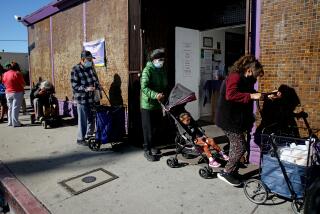Letters to the Editor: Homelessness is a mental health issue. State law isn’t helping

- Share via
To the editor: The Los Angeles Times’ and the UCLA California Policy Lab’s research confirms what we already knew: Mental health and substance abuse are dominant factors in the rise of homelessness in our county. I hope that this perspective will help us build a more compassionate approach to aid those languishing on the street. We must destigmatize seeking help for mental health and substance abuse.
We’ve made significant progress already. The county has established restorative care villages on our health campuses, increased the number of mental evaluation teams from eight to 33, and deployed 10 mental health mobile units.
Still, existing state law prevents the county from intervening effectively and getting people the treatment they need. This month, I will travel to Sacramento to meet with state leaders and advocate for reform and encourage the state to request a Medicaid waiver from the federal government to expand our mental health bed capacity.
We need tools to intervene earlier and prevent families and youth from falling into homelessness. We must actively engage vulnerable youth before their conditions become chronic and they fall into cycles of homelessness.
It is our responsibility to help those suffering from severe mental illness and substance use disorder, conditions that are manageable with appropriate treatment. But we cannot provide support to those on our streets until we acknowledge the factors that lead them there in the first place.
Kathryn Barger, San Marino
The writer is a member of the Los Angeles County Board of Supervisors.
..
To the editor: People who experience homelessness fall into it for a variety of reasons, including mental and physical health issues. Living on the streets is a response to the totality of each person’s circumstances, not just mental illness.
Whether individuals self-report a more recent bout of anxiety or a long history of treatment-resistant mental illness, it’s obvious that we need greater access to good mental healthcare.
But painting the vast majority of people living outside as having a mental illness stigmatizes people with mental illness. Most of us do not live outside; we live in care-giving environments and at home.
We know the homeless count conductors are not clinicians and that people most times self-report medical histories inaccurately. When we use broad strokes to define a whole group of people, let’s understand the imperfections and opportunities of the study on which they are based.
This time, the study says the L.A. County homeless population jumped 12% in the last year, and people are falling into homelessness faster than we can get them out of it. Let’s keep working at it from all the angles.
Brittney Weissman, Pasadena
The writer is executive director of the National Alliance on Mental Illness, Los Angeles County Council.
..
To the editor: No matter which of the figures is right, doesn’t either number still leave a lot of street campers who are there without a mental illness, an addiction problem or a physical disability?
Doesn’t that mean that a lot of people are on the streets simply because they can be and nobody stops them? That also would “back the public’s perception.”
Jeffrey C. Briggs, Hollywood
More to Read
A cure for the common opinion
Get thought-provoking perspectives with our weekly newsletter.
You may occasionally receive promotional content from the Los Angeles Times.









